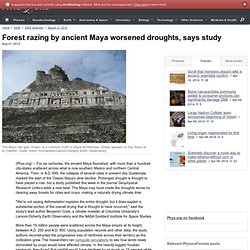

Forest razing by ancient Maya worsened droughts, says study. (Phys.org) -- For six centuries, the ancient Maya flourished, with more than a hundred city-states scattered across what is now southern Mexico and northern Central America.

Then, in A.D. 695, the collapse of several cities in present day Guatemala marked the start of the Classic Maya's slow decline. Prolonged drought is thought to have played a role, but a study published this week in the journal Geophysical Research Letters adds a new twist: The Maya may have made the droughts worse by clearing away forests for cities and crops, making a naturally drying climate drier. "We're not saying deforestation explains the entire drought, but it does explain a substantial portion of the overall drying that is thought to have occurred," said the study's lead author Benjamin Cook, a climate modeler at Columbia University's Lamont-Doherty Earth Observatory and the NASA Goddard Institute for Space Studies.
Oceans. Climate Change. Global Warming : Climate Change News, Facts, and Solutions. Arctic ice melt 'alarming' - Europe. Ice in Greenland and the rest of the Arctic is melting dramatically faster than was earlier projected and could raise global sea levels by as much as 1.6 metres by 2100, says a new study.

The study released on Tuesday by the Arctic Monitoring and Assessment Program (AMAP) said there is a "need for greater urgency" in fighting global warming as record temperatures have led to the increased rate of melting. The AMAP report said the correspondending rise in water levels will directly threaten low-lying coastal areas such as Florida and Bangladesh, but would also affect islands and cities from London to Shanghai. The report says it will also increase the cost of rebuilding tsunami barriers in Japan.